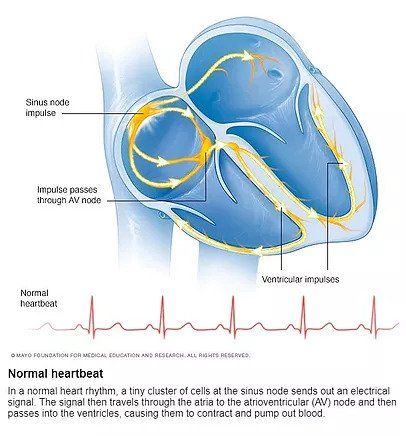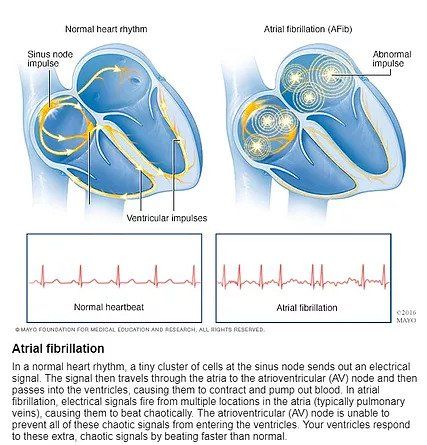Atrial Fibrillation Treatments
in Daytona Beach, FL
Fluttering, palpitations, or a light feeling in your chest can all be potential signs you are suffering from an arrhythmia. That arrhythmia could be atrial fibrillation(afib). We have the tools you need to find out.
No one plans on having heart problems, but if you do you need to find a doctor you can trust. At Complete Cardiology Care we staff Cardiologists and Electrophysiologists that treat patients with atrial fibrillation(afib) in Daytona Beach, Ormond Beach, Palm Coast, Deltona, Deland, and the surrounding areas.
2.7 Million
Suffer from recurrent
atrial fibrillation in the U.S.
Increases Risk
Stroke, blood clots, and heart failure
65-70
Mean age of Afib diagnosis.

A Normal Heart Beat
What is atrial fibrillation (afib)?
Normally, your heart contracts and relaxes to a regular beat. In atrial fibrillation, the upper chambers of the heart (the atria) beat irregularly (quiver) instead of beating effectively to move blood into the ventricles.
If a clot breaks off, enters the bloodstream and lodges in an artery leading to the brain, a stroke results. About 15–20 percent of people who have strokes have this heart arrhythmia. This clot risk is why patients with this condition are put on *blood thinners.
Even though untreated atrial fibrillation doubles the risk of heart-related deaths and is associated with a 5-fold increased risk for stroke, many patients are unaware that AFib is a serious condition.

Don't let afib control your life and get treated today
If you are curious how we can help you with atrial fibrillation, please reach out to us. We are currently accepting new patients. Complete Cardiology Care staffs Cardiologists and Electrophysiologist that serve patients in Ormond Beach, Daytona Beach, New Smyrna Beach, Port Orange, Deltona, Deland, and the surround areas.
Our Cardiologists and Electrophysiologists take nearly all insurances. We accept Aetna, AARP Medicare Complete, Blue Cross / Blue Shield, Cigna, Florida Healthcare, Florida Hospital Care Advantage, Freedom Health, Health First Health, Humana PPO - out of network benefits apply, Medicare, Optimum Healthcare, Railroad Medicare, Tricare, United Healthcare, VHN, Wellcare.
We are also a partner with the VA and are proud to serve those who have served our country!
Self Pay Cardiology services are available too! Call and ask for our price list.

